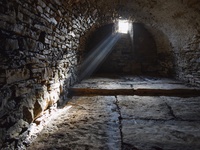Healing on the Sabbath: A Thought on the Mystery of Holy Saturday
Deacon Douglas McManaman
Christ heals on the sabbath. But isn’t the sabbath rest a symbol of eternity? We are in the 6th day, the day on which God created man in the image of himself (Gn 1, 26-31). In fact, all of human history is the 6th day, and the days prior to this day (days 1 to 5) represent the evolution of the universe and the world, leading up to the 6th day. When history comes to an end, when man’s work is done, we enter into the 7th day, the sabbath rest, or God’s rest (Heb 4, 10). But Jesus says: “My Father is still working, and I also am working” (Jn 5, 16-30).
The Father is unchanging activity, and activity and rest coincide in God. He does not stop working on the sabbath, and neither does the Son. Even in eternity, of which the sabbath day is a symbol, God is unchanging activity (contemplation). He is still saviour, and his Son is saviour (Jesus: “Yahweh is salvation”), because whatever the Father does, the Son does: “The Son can do nothing on his own, but only what he sees the Father doing” (Jn 5, 19). And so, the Son heals on the sabbath. Is not this a mirror reflection of what will continue in the eternal (aionios) sabbath? The Greek word ‘aionios’ does not mean eternal in the sense of ‘never ending’, but ‘other worldly’ (not this temporal world, but where God dwells), or ‘ages of ages’. In Christ, eternity is joined to the world of matter and time.
But who needs healing on the aionios sabbath? The forsaken do. Just as in the time of Christ on earth, the sick, the lame, and the poor were regarded as forsaken by God, in the aionios sabbath, there are those who “rise to their condemnation” (Jn 5, 29), because they did not believe in the Son of Man. Are they not the object of the divine mercy? They are indeed because they are the object of his justice, and the divine justice has been revealed as mercy. Does God, who is unchanging, suddenly change after the 6th day? Divine chastisement (kolasis) must, if it be truly a chastisement, come to an end; it cannot be forever–no one prunes a plant forever, for there would be nothing left. Pruning (kolasis) takes place for the good of the plant.
Jesus came not to condemn the world, but that the world may have life through him, but some will rise to their condemnation. This condemnation is not the final word, rather, life has the final word: “I say to you, the hour is coming and is now here when the dead will hear the voice of the Son of God, and those who hear will live” (Jn 5, 25). Holy Saturday is the realization of this promise. Christ descended into hell, as we profess in the creed (the word ‘dead’ was changed to ‘hell’ in the Roman liturgy). What does Christ do in hell? He is himself in hell, that is, he is “Jesus” (Yahweh is salvation); he is life. He does what he sees the Father doing–he proclaims the good news of salvation, and he freed all who were imprisoned therein:
Death, unwilling to be defeated, is defeated; corruption is transformed; unconquerable passion is destroyed. While hell, diseased with excessive insatiability and never satisfied with the dead, is taught, even if against its will, that which it could not learn previously. For it not only ceases to claim those who are still to fall [in the future], but also sets free those already captured, being subjected to splendid devastation by the power of our Saviour.… Having preached to the spirits in hell, once disobedient, he came out as conqueror by resurrecting his temple like a beginning of our hope, and by showing to [our] nature the manner of the raising from the dead, and giving us along with it other blessings as well (Cyril of Alexandria, Fifth Festive Letter, 29–40 (SC 372, 284). Quoted in Metropolitan Hilarion Alfeyev, Christ the Conqueror of Hell, p. 78).
Does God turn his back on anyone, even on those who reject him? Certainly not forever: “The Lord’s acts of mercy are not exhausted, his compassion is not spent; They are renewed each morning–great is your faithfulness… For the Lord does not reject forever (Lam 3, 22-23; 31).
